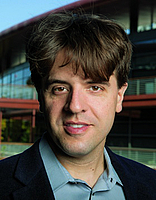Member in Focus
Karl Deisseroth awarded the 2023 Japan Prize

Professor Dr Karl Deisseroth
The American scientist Karl Deisseroth and his colleague Gero Miesenböck have been awarded the Japan Prize for Life Science. The psychiatrist and professor of bioengineering at Stanford University is being honoured for his successful research contributions in the field of life sciences. Alongside Miesenböck, Karl Deisseroth is credited as being one of the creators of optogenetics. Since 2014, he has been a member of the Leopoldina in the Neurosciences Section.
In his research, Karl Deisseroth aims to better understand the neural networks which malfunction in the case of psychiatric illness. He does this using methods he helped to develop, namely optogenetics – a mix of optical technology and genetics – and CLARITY (Clear Lipid-exchanged Anatomically Rigid/immunostaining-compatible Tissue hydrogel). CLARITY involves making the brain “transparent” by placing it in hydrogel and removing the fat, thus allowing for a post mortem examination of tissue in its anatomical structure. This made it possible to view the entire brain of a mouse with all neural connections and cellular details. The method is also of interest for cancer research. Optogenetics involves introducing proteins, such as those occurring in green algae and which react to light (channelrhodopsins), into nerve cells by means of a virus. The proteins act like a light switch, thereby allowing nerve cells in the brain to be controlled exogenously. Deisseroth was able to demonstrate his method on a live animal. Researchers now had a way to switch nerve cells on and off in a targeted manner.
Deisseroth, an American, studied biochemistry at Harvard University. At Stanford University, he received his PhD in neuroscience in 1998 and his MD in 2000. He has been a professor of bioengineering, psychiatry, and behavioural sciences at Stanford since 2005. Since 2013, he has also been a professor at the Karolinska Institutet in Stockholm, Sweden as well as a researcher at the Howard Hughes Medical Institute in Maryland, USA since 2014. Karl Deisseroth has been presented with many prestigious awards for his research contributions. These include the 2013 Brain Prize, the 2017 Else Kröner Fresenius Research Prize for Medical Research, the 2020 Heineken Prize for Medicine, and the 2021 Lasker Basic Medical Research Award. He became a member of the US National Academy of Sciences (NAS) in 2012.
The Japan Prize he and Gero Miesenböck have been awarded is one of the most prestigious research prizes in Asia. The Japan Prize Foundation honours scientists who have made creative and groundbreaking discoveries and thus contributed to great progress in their fields and for all humankind. The winners in the fields Life Science and Electronics, Information and Communication are awarded a total of 50 million Yen (approx. 490,000 Euros) each year.
